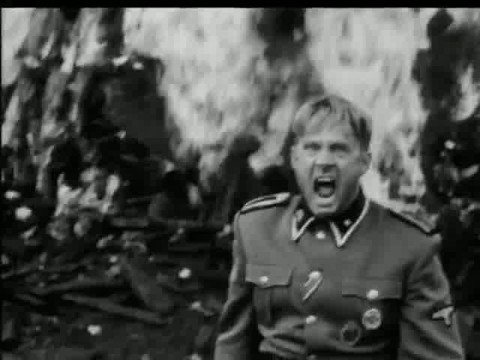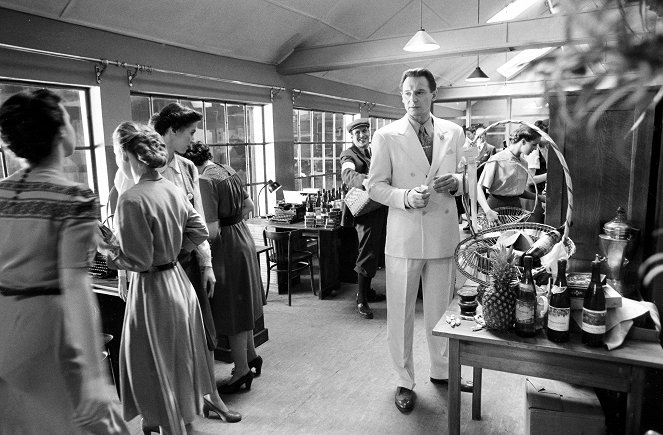Rendező:
Steven SpielbergForgatókönyvíró:
Steven ZaillianOperatőr:
Janusz KaminskiZeneszerző:
John WilliamsSzereplők:
Liam Neeson, Ben Kingsley, Ralph Fiennes, Caroline Goodall, Jonathan Sagall, Embeth Davidtz, Małgorzata Gebel, Mark Ivanir, Andrzej Seweryn (több)Streaming (2)
Tartalmak(1)
A film főhőse, Oskar Schindler született üzletember és szerencsejátékos. A második világháború legelején elkerül a megszállt Lengyelországba és azonnal megérzi, milyen hatalmas üzleti lehetőségek nyílhatnak meg előtte. Baráti kapcsolatok és némi ügyeskedés révén megszerez magának egy gyárat - a Deutsche Emailware Fabrikot - és nem győz eleget tenni a beözönlő megrendeléseknek. Könyvelője, Itzhak Stern rábeszéli arra, hogy minél nagyobb számban foglalkoztasson zsidókat, így nemcsak olcsó munkaerőt talál magának, hanem segíthet a koncentrációs táborokban szenvedő embereken. A gyár hamarosan a zsidók egyetlen menedéke lesz. 1944-ben a nácik az Endlösung, azaz a zsidókérdés végső megoldása jegyében bezáratják a helybéli táborokat, és a rabokat Auschwitzba és Treblinkába, vagyis a biztos halálba akarják küldeni. (AMC Hungary)
(több)Videók (8)
Recenziók (11)
Mit is írhatnék róla, ha nem akarom csak úgy szárazon felhozni az összes szuperlatívuszt, és hozzárendelni a filmkészítésének minden egyes eleméhez? Wellesnek van az Aranypolgár című filmje, Coppolának A Keresztapa I. filmje, Kubricknak az 2001: Űrodüsszeia filmje és Spielbergnek a Schindler listája című filmje. Ralph Fiennes által alakított Goethe Amon az emberi szellem hanyatlásának megtestesítője, aki történelmünk legnagyobb tragédiájáért felelős. John Williams filmzenéje a kortárs filmzene csúcsa, Janusz Kaminski operatőr a bálványom - mint a fekete-fehér kompozíció imádója számára -, a krakkói gettó kiirtása pedig az egyik legborzalmasabb jelenet, amit valaha filmvásznon láttam. Steven Spielberg ezzel a filmmel teljesítette azt a küldetést, amiért rendező lett. Én pedig legszívesebben bekeretezném minden egyes felvételét, és azt kívánnám, bárcsak visszaforgathatnám az időt, és megakadályozhatnám mindazt, amiről szól.
()
Spielberg's sensitive precision, Williams's music, Kaminsky's cinematography, Neeson's eyes, Fiennes's villain, Kingsley's everything, the little girl in the red dress walking through the black and white film... An unforgettable story. PS: Finally seen in the cinema on the occasion of the 25th anniversary. Indescribable experience.
()
Someone once described Schindler's List as the building block of Holocaust film history. Its influence confirms this, of course. Nicky's Family is not the only project that has taken inspiration from it almost literally, as Steven Spielberg simply chose to speak a universal language for academics and ordinary people alike.
()
When Spielberg puts forward his most fundamental mental dilemma alongside opinions and beliefs, nothing can arise but the strongest and extra tasty cinematic coffee and his intellectual peak. While Schindler's transformation from an ordinary citizen to an unstoppable advocate for all neighbors gains intensity perhaps a bit inconspicuously, during grand scenes and perfectly credible streams of thoughts from the mouths of the main characters, it becomes all the more emphatic. A truly unique and irreplicable work in its own way, in every aspect.
()
I consider Steven Spielberg to be one of the best storytellers in the world of film, regardless of how many stars I give to Schindler's List. He is an excellent craftsman and storyteller. Some voices in the community of film fans sometimes argue that he is too commercial and that they only take Schindler's List or Saving Private Ryan seriously from his work. I have the exact opposite feeling. Spielberg has always told fairy tales, whether for children or adults, and they are perfectly suited for relaxation and genre projects. Sci-fi, adventure stories, or fantasy from his workshop are usually treats. It's worse when he tries to enter the realm of high art and wants to do timeless, more serious work. Spielberg still uses similar or identical means as in his relaxation projects. In Schindler's List, several quite serious things bother me. First, the whole story is based on an artificially created myth, and even though its core is true, it ultimately sounds like Radio Yerevan reports. The facts are upside down here. Oskar Schindler was an adventurer, a Nazi not out of conviction but based on hard calculation, a manipulator, and a ruthless exploiter. Much negative can be said about him, and it would be much more accurate to despise and condemn him rather than admire him. Historical films usually approach the interpretation of historical facts languidly and only take from them what they need to achieve their goal or a partial effect. And usually, if it concerns distant history, viewers don't mind – except for historians and fans of historical science. But here it is so striking and concerns such a sensitive topic that it fundamentally bothers me. Schindler's real role has already been mapped by historians and completely contradicts everything Spielberg portrays in his film. In the labor camp, prisoners were mainly selected from the ranks of the Jewish police, collaborators, or those who had to pay. The conditions in the camp were very harsh, and its only advantage was that it was not systematically exterminationist, meaning that there were no gas chambers. Schindler was completely indifferent to the prisoners, and all he cared about was how to monetize their slave labor. By the way, neither Oskar Schindler nor anyone else saved any human lives. For those who were taken to the Protectorate, other prisoners had to be selected for liquidation… Another problem is Spielberg's typical squeezing of emotions, where possible, emotional manipulation, moving, blackmailing, and behaving like a typical blockbuster producer. Despite all this, he managed to convey the horrors of the Holocaust to the widest audience at a time when many decades had passed since the events and eyewitnesses were dying out, which is not insignificant. At the very least, the scene of the ghetto liquidation belongs among the memorable film moments. Overall impression: 60%.
()



Hirdetés